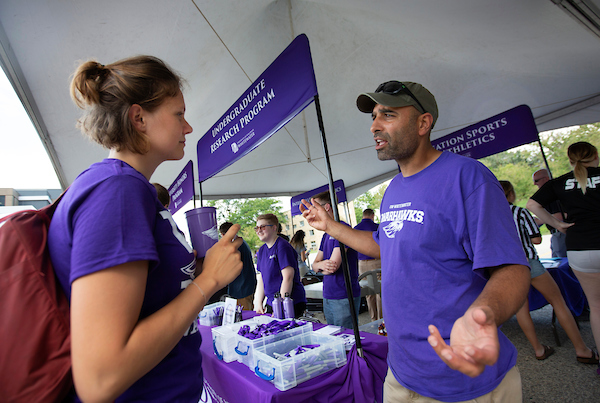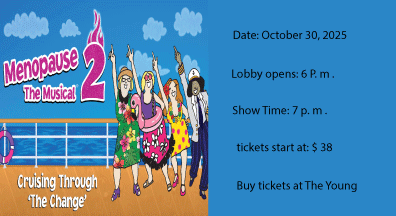Why conduct undergraduate research?

UW-WHITEWATER PHOTO/CRAIG SCHREINER
Associate professor of physics Jalal Nawash gives information to exchange student Lisa Wetzlmair of the Netherlands at the Undergraduate Research table. Games, prizes, information, music, dancing and fun are rolled into one event for new students at Hawk Fest on the UW-Whitewater campus on Monday, Sept. 2, 2019, on the day before fall classes begin. (UW-Whitewater photo/Craig Schreiner)
February 14, 2021
The effects of the pandemic will likely be long and far-reaching, and some aspects of our lives may never return to “normal.” Universities in particular will be grappling with larger questions about how online learning fits within a traditional university setting, diminishing enrollment and tighter budgets. Online learning environments are abundant and getting better every day– Udemy, LinkedIn Learning, and many other top-notch platforms offer online learning at a fraction of the price a student pays for “traditional” classes in college. Administrators will need to look within their campuses for solutions, and those of us within undergraduate research need to make the argument now that undergraduate research is one of the solutions. We have all seen firsthand the impact undergraduate research has on students and know the value it brings to the university, now we need to ensure those making the decisions about the future know this too. Below I have touched on what I feel are the most important points of that argument.
When I was an undergraduate student pursuing a bachelor’s degree in physics, I loved the classwork and I enjoyed the lectures, but I was always wondering how I could apply the knowledge I was gaining. The answer came when I noticed graduate students walking into a physics lab. I knew then that I needed to do research and work in a lab to connect my knowledge of physics to the real world. I started asking my professors for permission to work as a volunteer in a lab. Unfortunately, as an undergraduate student, none of my professors gave me permission to do lab work. Unable to find an opportunity in physics, I turned my focus to the chemistry department. Initially I faced the same denials, until one professor mentioned that they needed help cleaning their labware. I happily agreed, excited to be allowed inside, even though I knew I would only be watching the graduate students complete their research.
Being in the lab gave me room to grow as a student and allowed me to find more meaning in my classwork. In the few months that I cleaned that lab, I had the opportunity to become acquainted with graduate students, professors in departments of my interests, and, most importantly, a real research lab setting.
Doing research at an early age gives undergraduate students great confidence in pursuing the answers to their academic curiosities. They gain independence and critical thinking skills that aid them throughout their educational careers. The focus should not be teaching or lecturing students, but rather giving them the tools they need to grow their knowledge themselves, however they see fit. The world is changing rapidly and the way we need to engage students needs to adapt to those changes. Just 20 years ago, it would be very uncommon for an undergraduate student to be the author or co-author of an article in a peer reviewed journal. Now, many are participating and contributing to academic and professional articles. Undergraduate research benefits students in other ways as well– it looks good on a student’s resume, boosts their odds of finding a job and can help them choose a robust graduate program.
With the nationwide campus enrollment rate decreasing, unique and diverse opportunities must be offered as a way to combat those sinking numbers. Offering undergraduate research on campuses will not only increase the overall knowledge base and skill sets of students, but will also be a recruitment tool to encourage students to attend universities. Additionally, it can be a way to engage with donors and develop partnerships with companies and the community. The switch to virtual learning this past year has proven that students are dynamic, flexible, and independent learners who are more than capable of completing and benefiting from high-impact practices such as undergraduate research. Programs like undergraduate research need to be protected and supported consistently as they offer many important benefits to the student body and universities as a whole.
We should also be making efforts to incorporate high school students into research and lab work. Young students are incredibly capable of learning and developing new skill sets and are often motivated and excited to complete work that many senior researchers do not have the time or motivation to finish. One of my own students learned how to automate a box furnace with some Python coding and an Arduino in just a few days, whereas I had been working on this for a few months.
Looking at my own field, physics, we see that most of the great breakthroughs and theories came from physicists at a very young age. Think of Einstein, Newton, de Broglie–they made most of their contributions when they were in their early 20s. Why were they able to do that? Perhaps because they had out-of-the-box ideas, unencumbered by the structure, discipline and routine of class work. When we deprive students of any academic status the opportunity to complete undergraduate research, we are depriving ourselves of developing knowledge, advancing techniques, and spreading information. Undergraduate students have less of a sense of discipline for their work in research when they are starting out, which is beneficial for the creation and development of unique, diverse, and innovative ideas.
Let our students excel by involving them in undergraduate research–whether it is in physics, chemistry, biology, sociology, art, literature, comparative religion, or any other academic field. It is a mutually beneficial experience for the students, the researchers and the university as a whole.












